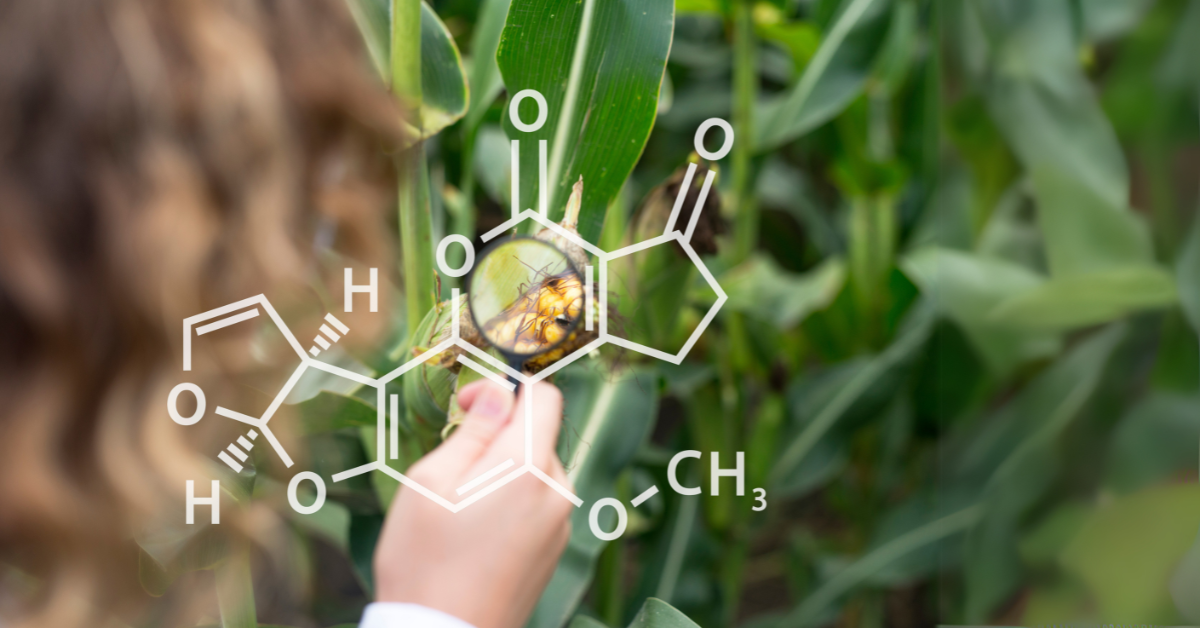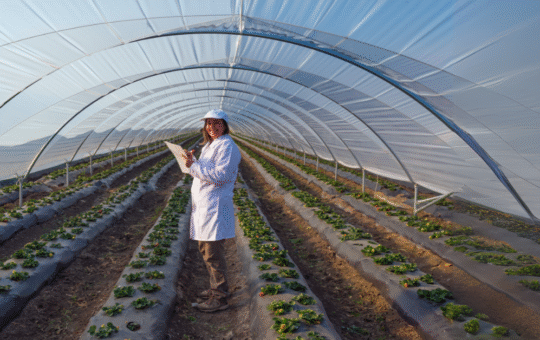
Level 1 Award: Fundamentals of Crop Production and Protection
- Foundation in Crop Production: Understand the basic principles of crop cultivation, including soil preparation, sowing, irrigation, and harvesting techniques.
- Knowledge of Pest and Disease Management: Learn how to identify common pests and diseases that affect crops and the methods used to manage and protect crops.
- Sustainable Practices: Gain insights into sustainable crop production methods that minimize environmental impact and maximize yield.
- Practical Skills: Develop practical skills for working with crops and implementing protection measures against common agricultural challenges.
- Career Pathway: Opens opportunities for further studies and careers in agriculture, including crop management, farm operations, and agricultural science.
- Understand the Basics of Crop Production: Learn the principles of crop cultivation, including soil preparation, crop rotation, and irrigation.
- Recognize the Stages of Crop Growth: Understand the different stages of plant growth and the requirements for each stage, from planting to harvesting.
- Identify Common Crop Pests and Diseases: Identify the major pests and diseases that affect crops and their potential impact on yield.
- Learn Pest and Disease Control Methods: Understand how to apply integrated pest management (IPM) techniques, including biological, chemical, and cultural control methods.
- Understand Environmental Factors: Learn about environmental factors such as climate, soil type, and water availability that affect crop growth and health.
- Apply Sustainable Crop Protection Practices: Understand and implement sustainable crop protection practices that reduce environmental damage and improve food security.
- Learn Basic Harvesting and Post-Harvest Handling: Understand harvesting techniques, post-harvest handling, and storage methods to ensure quality and reduce crop loss.
- Introduction to Crop Production
- Overview of crop production and its importance in the agricultural industry.
- Study of key factors influencing crop growth, such as soil quality, climate, and water.
- Introduction to the different types of crops and their cultivation requirements.
- The Life Cycle of Crops
- The stages of crop growth: germination, vegetative growth, flowering, fruiting, and harvesting.
- Understanding the nutritional requirements of crops at different growth stages.
- How to monitor and manage crop growth to maximize productivity.
- Soil Preparation and Fertilization
- The importance of soil preparation for successful crop production.
- Introduction to soil types, soil testing, and soil amendments.
- Basics of organic and chemical fertilizers and their applications.
- Pest and Disease Identification
- Identification of common pests and diseases that affect crops, including insects, fungi, bacteria, and viruses.
- How to recognize symptoms of pest infestations and diseases in crops.
- The role of pests and diseases in reducing crop yields and quality.
- Integrated Pest Management (IPM)
- Introduction to integrated pest management techniques, including biological, mechanical, and chemical controls.
- How to apply IPM methods to minimize pest damage while protecting the environment.
- The use of natural predators, resistant crop varieties, and crop rotation as pest control strategies.
- Sustainable Crop Protection Practices
- The role of sustainable agriculture in protecting crops and the environment.
- Organic and eco-friendly pest management practices.
- How to reduce chemical pesticide use and its impact on ecosystems.
- Harvesting and Post-Harvest Handling
- Understanding the right timing for harvesting different types of crops.
- Methods of post-harvest handling, including storage, transportation, and processing to preserve crop quality.
- Basic storage techniques to reduce crop losses and improve shelf life.
- Crop Production Technician
- Farm Worker
- Agricultural Consultant
- Pest Control Specialist
- Farm Manager
- Agricultural Engineer (with further qualifications)
- Sustainable Agriculture Specialist
- Comprehensive Curriculum: Gain a well-rounded understanding of crop production and protection, with practical applications.
- Industry-Relevant Skills: Learn the key skills needed to succeed in the agricultural industry and improve your job prospects.
- Experienced Instructors: Benefit from expert instructors with extensive experience in crop management and agricultural science.
- Hands-On Learning: Experience practical, real-world applications of crop production and protection techniques.
- Pathway to Further Study: This course provides the foundation for further study in agricultural sciences, crop management, and sustainable farming.
Study Units
- Introduction to Crop Production
- Overview of crop production and its importance in the agricultural industry.
- Study of key factors influencing crop growth, such as soil quality, climate, and water.
- Introduction to the different types of crops and their cultivation requirements.
- The Life Cycle of Crops
- The stages of crop growth: germination, vegetative growth, flowering, fruiting, and harvesting.
- Understanding the nutritional requirements of crops at different growth stages.
- How to monitor and manage crop growth to maximize productivity.
- Soil Preparation and Fertilization
- The importance of soil preparation for successful crop production.
- Introduction to soil types, soil testing, and soil amendments.
- Basics of organic and chemical fertilizers and their applications.
- Pest and Disease Identification
- Identification of common pests and diseases that affect crops, including insects, fungi, bacteria, and viruses.
- How to recognize symptoms of pest infestations and diseases in crops.
- The role of pests and diseases in reducing crop yields and quality.
- Integrated Pest Management (IPM)
- Introduction to integrated pest management techniques, including biological, mechanical, and chemical controls.
- How to apply IPM methods to minimize pest damage while protecting the environment.
- The use of natural predators, resistant crop varieties, and crop rotation as pest control strategies.
- Sustainable Crop Protection Practices
- The role of sustainable agriculture in protecting crops and the environment.
- Organic and eco-friendly pest management practices.
- How to reduce chemical pesticide use and its impact on ecosystems.
- Harvesting and Post-Harvest Handling
- Understanding the right timing for harvesting different types of crops.
- Methods of post-harvest handling, including storage, transportation, and processing to preserve crop quality.
- Basic storage techniques to reduce crop losses and improve shelf life.
Upon successful completion of this course, learners will be able to:
- Understand the Basics of Crop Production: Learn the principles of crop cultivation, including soil preparation, crop rotation, and irrigation.
- Recognize the Stages of Crop Growth: Understand the different stages of plant growth and the requirements for each stage, from planting to harvesting.
- Identify Common Crop Pests and Diseases: Identify the major pests and diseases that affect crops and their potential impact on yield.
- Learn Pest and Disease Control Methods: Understand how to apply integrated pest management (IPM) techniques, including biological, chemical, and cultural control methods.
- Understand Environmental Factors: Learn about environmental factors such as climate, soil type, and water availability that affect crop growth and health.
- Apply Sustainable Crop Protection Practices: Understand and implement sustainable crop protection practices that reduce environmental damage and improve food security.
- Learn Basic Harvesting and Post-Harvest Handling: Understand harvesting techniques, post-harvest handling, and storage methods to ensure quality and reduce crop loss.
The Level 1 Award in Fundamentals of Crop Production and Protection is designed for individuals who are interested in starting a career in agriculture or improving their understanding of crop cultivation and protection. This course is ideal for:
Aspiring Agricultural Professionals
Those looking to enter the agriculture industry with foundational knowledge in crop production and pest management.
Farm Workers and Operators
Individuals who want to enhance their skills in crop production, from soil preparation to harvest, and gain practical knowledge in crop protection.
Pest Control Technicians
Professionals in pest control looking to deepen their understanding of pest and disease management in crops, particularly through sustainable practices.
Agricultural Consultants
Those aiming to provide advice and guidance to farmers and agricultural businesses on improving crop yields and minimizing damage from pests and diseases.
Sustainable Agriculture Enthusiasts
Individuals passionate about sustainable farming practices who want to understand how to reduce environmental impact while maintaining high crop productivity.
Students and Beginners in Agriculture
Anyone with a general interest in the agricultural industry or those wishing to pursue further studies in crop management, agriculture, or environmental sustainability.
Our assessment process is designed to ensure every learner achieves the required level of knowledge, skills, and understanding outlined in each course unit.
Purpose of Assessment
Assessment helps measure how well a learner has met the learning outcomes. It ensures consistency, quality, and fairness across all learners.
What Learners Need to Do
Learners must provide clear evidence that shows they have met all the learning outcomes and assessment criteria for each unit. This evidence can take different forms depending on the course and type of learning.
Types of Acceptable Evidence
Assignments, reports, or projects
Worksheets or written tasks
Portfolios of practical work
Answers to oral or written questions
Test or exam papers
Understanding the Structure
Learning outcomes explain what learners should know, understand, or be able to do.
Assessment criteria set the standard learners must meet to achieve each learning outcome.
Assessment Guidelines
All assessment must be authentic, current, and relevant to the unit.
Evidence must match each assessment criterion clearly.
Plagiarism or copied work is not accepted.
All learners must complete assessments within the given timelines.
Where applicable, assessments may be reviewed or verified by internal or external quality assurers.
Full learning outcomes and assessment criteria for each qualification are available from page 8 of the course handbook.
Top Courses
No results found.
Related Courses
Let's Get in touch
Deleting Course Review
Course Access
This course is password protected. To access it please enter your password below:



